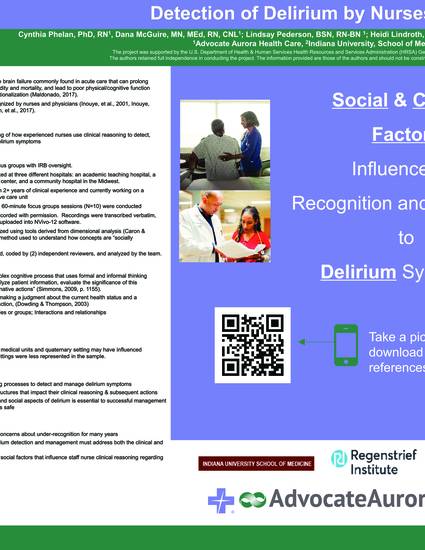
Objective: Delirium is an acute brain failure commonly experienced by hospitalized patients with serious consequences when it is not recognized and treated. Little is known about why difficulties occur or what can be done improve delirium detection. The study objective was to increase our understanding of how experienced nurses use clinical reasoning to detect, diagnose, and respond to delirium symptoms and identify improvement opportunities.
Methods: Ten focus groups were conducted with experienced staff nurses at three diverse medical centers in the Midwest. Sessions were audio-recorded, transcribed, reviewed, and coded using NVIVO-12 software. Dimensional analysis was used to identify concepts, conditions, and processes.
Results: Participants (N=39) ranged in age from 18-65 (59%yrs), were female (97%), Caucasian (87%) and worked on medical (42%), surgical (31%), and intensive care (28%) units. Most were BSNprepared or higher (81%), certified (28%), worked 12-hour shifts (51%), and managed delirium more than 1-2 times per week (84%). Nurses describe having knowledge to identify and manage delirium, prioritizing care to maintain patient safety. Nurses use a variety of nonpharmacological strategies to address changes in patient status. The nurses described that the diagnosis of delirium is not necessary to manage symptoms and behaviors. Nurses reported negative consequences to discussing or making a diagnosis of delirium. Both the clinical and social aspects of the nurse’s approach are related to the nature of delirium and their experience with delirium, the environment, the family, and interprofessional communication. Navigating both the clinical and social aspects of delirium is essential for successful management.
Conclusions: Nurses use clinical reasoning processes to manage delirium symptoms. These processes and their subsequent actions are influenced by social factors. The nurse work within social structures that impact their thinking and actions. A larger study examining social factors that influence staff nurse clinical reasoning regarding delirium is recommended.
Phelan C, McGuire D, Pederson L, Reopelle S, Jacobson N, Hook M. Enhancing the detection of delirium by nurses in acute care. Poster presented at: American Delirium Society 2019 Annual Scientific Meeting; June 16, 2019; Boston, MA.
McGuire D, Pederson L, Reopelle S, Jacobson N, Phelan C, Hook M. Enhancing the detection of delirium by nurses in acute care. Poster also presented at: Advocate Aurora Health Advancing New Knowledge Research Conference; September 18, 2019; Wheeling, IL.
